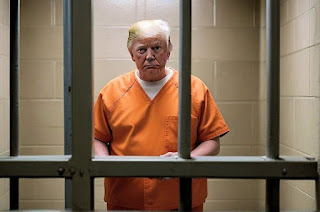In a world where the unexpected seems to be the only constant, it's no surprise that the powers of the presidency in times of crisis have come under scrutiny. The recent revelation of the existence of the "Presidential Emergency Action Documents" (PEADs) has sparked concern and raised eyebrows across the political spectrum. These classified documents outline the extraordinary powers that a US president can claim in the event of a national emergency or disaster, and it's safe to say that they make for some pretty hair-raising reading.
The PEADs are like a Doomsday book of sorts, outlining powers for the president to suspend habeas corpus, impose martial law, restrict travel, and limit communications, among other actions. It's the kind of stuff that would make even the most ardent supporter of executive power pause for thought. During Trump's first term, his staff reportedly tried to keep him from learning the full extent of these powers, fearing that he would abuse them. And let's face it, with a man who once suggested injecting disinfectant as a potential cure for COVID-19 at the helm, those fears were not entirely unfounded.
Now, some former Trump advisors are warning that if he regains the presidency, he could use these powers in situations that fall short of true crises. It's the kind of scenario that sends shivers down the spine of anyone who values democracy and the rule of law. The fact that there is little oversight or public knowledge about the PEADs only adds to the sense of unease. A bipartisan group of senators is pressing for more transparency, but as we all know, getting Congress to agree on anything these days is about as likely as finding a unicorn in your backyard.
The history of presidential emergency action documents is as murky as a swamp in the dead of night. Originally used for continuity of government plans, they have since been used to authorize detention of "alien enemies" and other "dangerous persons," suspend habeas corpus, implement martial law, and even censor news reports. It's the kind of stuff that would make George Orwell's head spin.
The number of PEADs has grown from 48 in the past to 56 as of 2017, and they undergo periodic revisions. It's like a never-ending game of executive power bingo, with new powers being added to the mix every few years. And if you're thinking, "Well, at least there must be some kind of oversight or requirement for transparency," think again. These documents are classified "secret" and have never been declassified or leaked. It's like a game of hide and seek where the American people are the ones left in the dark.
But fear not, dear reader, for there are some glimmers of hope on the horizon. Congress has taken various actions to increase transparency and oversight over PEADs, including introducing legislation and holding hearings. It's like a ray of sunshine breaking through the storm clouds, offering a sliver of hope in an otherwise gloomy landscape.
In fact, government documents and presidential library files related to PEADs have been obtained through Freedom of Information Act (FOIA) requests. It's like peeling back the layers of an onion to reveal the truth hidden within. Organizations like the Brennan Center for Justice have analyzed and written about the dangers of unchecked emergency powers, highlighting the need for the president to disclose PEADs to congressional oversight committees. It's like a rallying cry for democracy in the face of potential tyranny.
Some experts argue that the existing safeguards and protocols would make it difficult for a president to unilaterally abuse the powers in the PEADs. It's like a safety net woven from the threads of democracy, ready to catch us if we fall into the abyss of authoritarianism.
But let's not kid ourselves. The mere existence of these documents is cause for concern. The fact that they remain shrouded in secrecy only adds fuel to the fire. In a democracy, transparency and accountability are not optional extras; they are the very foundation upon which our system is built.
So, what can we do in the face of this potential threat to our democracy? We can raise our voices and demand transparency. We can hold our elected officials accountable and ensure that they act in the best interests of the American people. We can exercise our right to vote and make our voices heard at every level of government.
In conclusion, the existence of the PEADs should serve as a wake-up call to anyone who values democracy and freedom. We cannot afford to be complacent in the face of potential abuses of power. The time to act is now, before it's too late. As Thomas Jefferson once said, "Eternal vigilance is the price of liberty." It's time to roll up our sleeves and get to work in defense of our democracy.
Ex-Trump Aides Fear Second Term Crisis | TIME https://time.com/7086057/donald-trump-second-term-emergency-aides/
Presidential Emergency Action Documents | Brennan Center for Justice https://www.brennancenter.org/our-work/research-reports/presidential-emergency-action-documents
What Can a President Do During a State of Emergency? - The Atlantic https://www.theatlantic.com/magazine/archive/2019/01/presidential-emergency-powers/576418/
What Can a President Do During a State of Emergency? - The Atlantic https://www.theatlantic.com/magazine/archive/2019/01/presidential-emergency-powers/576418/ 1/20
The Alarming Scope of the President's Emergency Powers From seizing control of the internet to declaring martial law, President Trump may legally do all kinds of extraordinary things. https://www.congress.gov/116/meeting/house/108974/documents/HHRG-116-JU10-20190228-SD006.pdf
Kamala Harris for President: Official Campaign Website https://kamalaharris.com/











































































